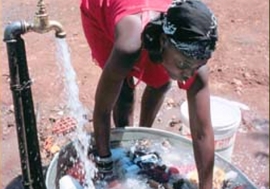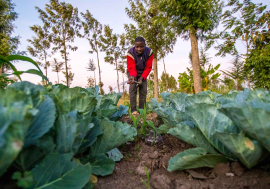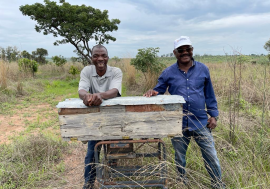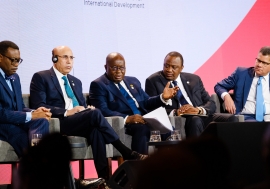Africa secures new Southern partners
Africa secures new Southern partners
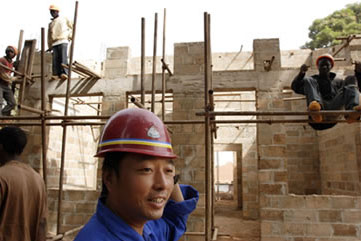 A Chinese foreman walks past a construction site in Guinea-Bissau: China is financing infrastructure projects in Africa that other donors are reluctant to back.
A Chinese foreman walks past a construction site in Guinea-Bissau: China is financing infrastructure projects in Africa that other donors are reluctant to back.Over the last decade, the make-up of Africa’s donors and investors has changed significantly, with newcomers from the South playing an increasingly important role. China, India, Brazil and other developing countries are providing African nations with new sources of financing and enabling them to lessen their dependence on traditional donors from the North.
As these new players emerge, there have been calls for them to improve their aid and investment practices in line with standards that have been adopted by the wider donor community. In a report to a high-level meeting on Africa’s development needs in the General Assembly on 22 September, UN Secretary-General Ban Ki-moon urged these new development partners to support current international efforts to harmonize and coordinate donor policies, to make their aid more effective.
Some of the discussions about Southern financing for Africa have become heated. The Group of Eight (G-8) industrial nations — which includes a number of Africa’s long-time donors — has been especially vocal in calling on the new donors to adjust their aid policies. At its summit last year in Heiligendamm, Germany, the G-8 issued a declaration, “Growth and Responsibility in Africa,” that urged the continent’s new donors “to improve transparency of their aid and to follow internationally shared principles.” The G-8 called on the new donors to “fully share information on their lending to low-income countries.”
At the same time, the G-8 pressed African countries to continue to pursue “sound policies,” which generally have included maintaining balanced budgets, favouring private sector development and liberalizing domestic and external trade. The G-8 also insisted on promoting the “universal values” of human rights, democracy and good governance.
African critics of Northern donor practices have long viewed such policy prescriptions as heavy-handed. Some also interpreted recent Western criticisms of the “no strings” aid policies of China, India and other new donors as an expression of concern that Northern influence may be eroding somewhat.
After China announced in September 2007 that it will extend some $5 bn in financing to the Democratic Republic of the Congo (DRC) to build roads and other infrastructure over several years, officials from Belgium, the International Monetary Fund and other Northern institutions voiced doubts about such transactions. An editorial in the Congolese daily Le Potentiel responded: “The DRC is sovereign and can contract bilateral and multilateral agreements.... It is good for the DRC to multiply its partners.”
And while Western powers are insisting that China and India become more accountable in their aid and investment practices, some in Africa point out that the Northern donors themselves tend to pursue a one-way approach to accountability. Current accountability requirements “are often harder on developing countries than donors,” notes Mr. Yash Tandon of the South Centre, an intergovernmental think tank for developing countries. He cites the case of Tanzania, which hosted 541 donor missions in 2005 alone and had to account to donors for 700 projects managed by 56 implementation offices. Despite recent commitments by Northern aid agencies to improve their practices, he adds, Tanzania’s donors prepare “performance conditionalities” in consultation with the World Bank, but without the participation of the recipient country.
Loans, credits, investment
One of the most significant features of recent trends in the global economy is the acceleration of trade, aid and investment among developing countries. According to the World Bank, since 2000 there has been a huge increase in trade between Africa and Asia. Today, Africa sends 27 per cent of its exports to Asia compared to 14 per cent in 2000, almost equivalent to Africa’s exports to the US or the EU. Asia’s exports to Africa are also growing rapidly, about 18 per cent annually, faster than to any other region.
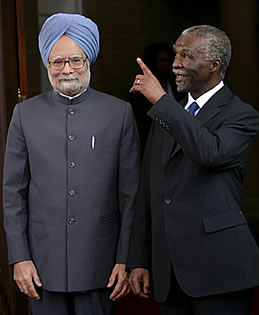 Indian Prime Minister Manmohan Singh with then South African President Thabo Mbeki: India has promised to double trade loans to Africa and scholarships for African students.
Indian Prime Minister Manmohan Singh with then South African President Thabo Mbeki: India has promised to double trade loans to Africa and scholarships for African students.In 2006 President Hu Jintao told a conference attended by 48 African leaders in Beijing that China would double aid to Africa by 2009. It would also cancel the debts of 33 African countries, provide $5 bn in concessional loans and credits and establish a $5 bn fund to encourage Chinese investment in Africa. In 2008, China promised $20 bn over the next three years to finance infrastructure development in Africa. The country’s cumulative foreign direct investment in Africa amounted to $1.3 bn at the end of 2005.
Over the last four years, trade between India and Africa has tripled to $25 bn. Indian Prime Minister Manmohan Singh announced at an India-Africa Forum in New Delhi in April that his country will double trade credits to Africa to $5.4 bn in 2008–09, and will increase the number of scholarships it gives to students from Africa from about 4,000 to 8,000 annually.
“India and China have different patterns of aid,” notes Dorothy McCormick of the Institute for Development Studies at the University of Nairobi in Kenya. “India concentrates on non-monetary aid mainly in the form of technical assistance and scholarships, while China offers a wider range of monetary and non-monetary aid packages, which include grants and loans for infrastructure, plant and equipment.”
Chinese assistance is often tied to the use of Chinese goods and services, she notes, and “requires adherence to the ‘One China’ policy,” that is, that recipient countries withhold diplomatic recognition from the Taiwan authorities. But, she adds, it “does not carry the ‘good governance’ conditionalities that currently characterize Western donors.” As a result, China has often been accused of being lenient with authoritarian regimes in Africa (although some Western governments have also been criticized for supporting autocratic governments in Africa).
“We are dedicated to non-interference and social development of African countries,” says Ms. Sun Baohong of the Chinese Embassy to the US. She says criticism of Chinese policy from Africa’s traditional partners is due to misunderstanding and fear of competition. “Some people fear for their domination in this regard, and they fear that the alternative constitutes competition.”
Ms. Sun says her government believes that the use of sanctions and other punitive measures promoted by the West against governments that abuse human rights are not productive and increase hostility. “We think that when you’re dealing with a failing state or a sensitive state, other methods than those used by Western people will be more productive.” Chinese involvement in Africa, she says, is in the spirit of South-South cooperation.
Paris Declaration
In 2005, the 22 traditional donor nations that belong to the Development Assistance Committee (DAC) of the industrialized countries’ Organization for Economic Cooperation and Development (OECD) adopted the Paris Declaration in an effort to make their aid practices more effective and accountable. Using 12 indicators to monitor progress, the new approach theoretically allows donors and recipients to hold each other to account. By December 2007, the declaration had been endorsed by 115 countries.
Although China was among the signatories, notes Thomas Fues, a researcher at the German Development Institute, “it plays no part in the efforts of the OECD to achieve harmonization.” As a result, he adds, “it does not provide any information on the volume, focal areas and instruments of its donor programmes.”
Compared to China, India has adopted a more multilateral approach in Africa, Mr. Fues observes, signing economic treaties with regional entities such as the African Union (AU), the New Partnership for Africa’s Development (NEPAD), the Southern African Development Community and the Economic Community of West African States. “As the world’s largest democracy,” says Mr. Fues, “India finds itself in harmony with the declared societal values of the AU and NEPAD, but agrees with China’s position on absolute sovereignty,” that is, not interferring in a country’s domestic political affairs.
In terms of openness and accountability, the DAC countries themselves are not above criticism, some analysts point out. “There is no real mutual accountability, contrary to the Paris Declaration’s stated objective,” argues Mr. Tandon of the South Centre, in a paper analyzing the declaration. “If recipient countries do not perform, they are subject to penalties. But if donor countries do not perform, they are not penalized.” While in normal business transactions banks and borrowers both take risks and absorb the costs of default, “in the aid architecture proposed by the OECD, the risks are taken by recipient countries alone.” Such flaws, he notes, are driving African countries to seek donor partners elsewhere.
OECD countries that are not members of the DAC are also becoming increasingly important donors, including the Czech Republic, Hungary, Iceland, Korea, Mexico, Poland, the Slovak Republic and Turkey. Several non-OECD countries, including Israel and Kuwait, are also emerging as key donors. However, among the new donors, China is by far in the lead. China does not publish its aid budget but the OECD estimates that the country provides more than $5 bn in aid annually. India and Russia contribute about $100 mn each, while all the other new donors provide less than $10 mn each.
Extension of foreign policy
Because China and India are the largest new donors, a lot of attention has focused on their policies. According to a recent World Bank study, the commercial activity of Chinese and Indian companies in Africa is actively supported by their governments. Through the Export-Import Bank of China and the China Development Bank, the government provided export credits, loans and investment guarantees to Chinese investors totalling $800 mn in 22 countries at the end of 2005. In a similar fashion, the Export-Import Bank of India extended a line of credit totalling $558 mn in 2006 to African countries.
Such government backing has sometimes led to “the perception that the overseas activities of Chinese and Indian companies are an extension of the two countries’ foreign policies,” notes Harry Broadman, an economic adviser at the World Bank (who adds that US and European policies have similarly used aid to advance their private sectors).
Such perceptions, says Mr. Broadman, author of a 2007 study, Africa’s Silk Road — China and India’s New Economic Frontier, “can be a public-relations headache for Beijing and New Delhi, given some of the downsides of these activities for Africans.” He cites a number of imbalances in their economic relationship with Africa. Africa’s exports to Asia remain limited. Meanwhile, typical Chinese and Indian investments in Africa, such as large-scale oil or mineral exploration projects, are capital-intensive and create few new jobs. Other investments, as in textiles, sometimes displace African producers. “Competition can spur African firms to become more efficient, but it can also create unemployment and inflict other social costs,” Mr. Broadman says.
Investment from India and China, like most other investment coming into Africa, has largely been in the extractive sectors, such as oil and mining. The two countries are however diversifying into apparels, food processing, retail, real estate, fisheries, tourism, power plants and telecommunications. “China and India are pursuing commercial strategies with Africa that are about far more than resources.” the World Bank report acknowledges.










